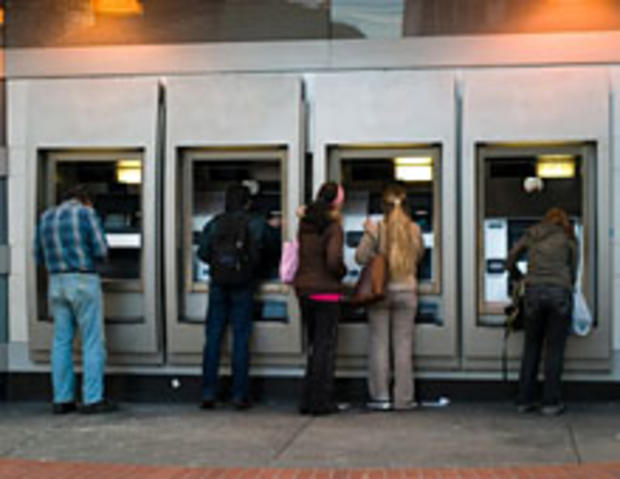12 Steps to Kick Your Bank Fee Addiction
 Feel like you're powerless to avoid bank fees, particularly in the wake of Bank of America's new $5 debit card fee and Citibank's announcement that many customers will pay more for checking accounts?
Feel like you're powerless to avoid bank fees, particularly in the wake of Bank of America's new $5 debit card fee and Citibank's announcement that many customers will pay more for checking accounts?
It's true that bank fees are rising, seemingly everywhere. Indeed, where three-quarters of the nation's banks offered free checking in 2009, only 45% do today, according to BankRate.com, which conducts an annual survey of checking account costs. Average fees have jumped as much as 76%, while the balances required to avoid a fee has roughly doubled.
But you don't have to pay more. In fact, you may well be able to get more (or better) bank services for less money. You just need to follow our 12-step program (apologies and thanks to Alcoholics Anonymous) to kick your addiction to big bank fees.
Step One: Accept that you are powerless over addiction.
Are you addicted to your bank?
Do you find yourself wondering when you'll next be able to wait in a long line to speak with an indifferent teller? When you'll be able to cough up $5 or $10 of your hard-earned cash to pay an inexplicable fee disclosed only in a 65-page "terms of service" agreement that you tossed as junk mail? When the bank will next clean out your checking account by re-ordering all your checks and debit card transactions to charge multiple overdraft fees, instead of the one that you actually deserved?
No? You say you hate those things and have come to dread every contact with your bank? Well, then, you may be powerless over addiction. But you're not addicted. You're afflicted. And that, you can fix. Go to step two.
Step two: Believe you can get help from a power greater than yourself.
 Step Two: Believe that you can get help from a power greater than yourself
Step Two: Believe that you can get help from a power greater than yourself
If you were addicted to alcohol or drugs, you'd be counting on God's help. But when it comes to escaping bank fees, you need the Internet. In fact, the Internet Innovation Alliance estimates that the average consumer saves about $8,000 a year, thanks to the web's vast shopping power.
Attempting to shop bank rates without the web would take days pf phone calls, but with a web browser and a good bank-shopping site and it's another matter entirely. The best place to start looking for a new checking account is BankRate.com, which also offers a nice little primer on how to shop for checking accounts. But don't forget about credit unions, which are non-profit organizations that serve members of specific groups. They often offer lower rates on loans and charge fewer fees. You can find a credit union serving your area here.
Step Three: Make a decision to turn your life over to the higher power.
 Step Three: Make a decision to turn your life over to the higher power.
Step Three: Make a decision to turn your life over to the higher power.
It's one thing to find a cheaper checking account. It's another thing to get over the personal inertia that stops us from using this higher power to find and switch to a better bank. But what causes this inertia?
Usually practical things. You have outstanding checks and need for them to clear; you've set up automatic payments that would need to be switched; you don't want to have to type in all of your various creditors into a new online banking account. Besides, you think bank teller #4 is hot and you'll miss flirting with her when you deposit checks.
Let's address those practical issues. Make a list of exactly what you'll need to fix when you switch, but don't worry too much about typing in all of those names and addresses. You can type them into your new account one at a time, as you get the bills. My guess is that when you review the list, it won't be as intimidating as you thought. Now, give the hot bank teller your phone number (why not?), and make the commitment to switch.
Step four: Make a fearless moral inventory
Step four: Make a fearless moral inventory
Do you ever bounce checks? Do you sometimes pay a surcharge to use another bank's ATM machine? Are you incapable of keeping enough money in your account to cover the minimum balance requirement that gets your bank to waive monthly checking charges?
Go ahead and admit -- write down, even -- all the ways your personal behavior causes your bank to charge you more. Are you doing this so that you can change your ways? That would be nice, of course. But, realistically, we are doing this to better comparison shop.
Step Five: Admit to someone else the exact nature of your wrongs.
Sure you could vow to never bounce a check again -- to always have enough in your account to cover the minimum balance. But do you really think you'll change your ways? We all slip up here and there. If you've consistently made a few costly banking transgressions, figure that you might make these same mistakes again and shop with your "wrongs" in mind.
If you have trouble maintaining the minimum balance, look for accounts that don't require as much money on deposit. If you occasionally bounce a check, look for institutions that levy the lowest bounced-check fees. That should narrow the list of banks you're considering to just a few.
Finally, do the "admit to others" step by picking up the phone and calling the new accounts representatives at those banks. Tell them how you bank and that you sometimes bounce checks (or whatever you do) and ask them to help you figure out what type of account or bank services would help you keep your costs to a minimum.
Step six: Prepare to remove these defects of character
 Step six: Prepare to remove these defects of character.
Step six: Prepare to remove these defects of character.
Even if you find the institution offering the cheapest overdraft fees and the smallest minimum balance for a free account, you have to know that banks -- even credit unions -- will penalize you if you break their rules. So it's important to figure out why your banking habits aren't up to snuff.
Are you poor, or do you simply lack discipline or bookkeeping skills? Nearly every problem has a solution, but the solutions are different for different problems. So face your demons.
Step seven: Ask for help
 Step seven: Ask for help
Step seven: Ask for help
Once you know why you're messing up, you can formulate a plan to fix the problem. Like what?
Let's say your problem is simply that you've never met a shoe sale you could pass up. You can barely get into your apartment through the forest of shoes. Interesting research by Joseph Grenny, co-author of "Change Anything," suggests the solution: You need a buddy. Positive reinforcement from a friend can be pivotal in changing bad habits, he says. So which of your friends has the most spending discipline? Would that person agree to help you -- like AA sponsors help keep alcoholics sober -- with moral support?
Not your problem? You're simply poor? Could the people who normally give you presents for birthdays and holidays be convinced to give you cash this year, instead? If so, and if you don't spend the cash, you'll have a nest-egg that could save you from paying bank fees forever.
But it's budgeting? Consider getting budget help either through an online tool, or from a non-profit credit counselor. The links above will take you to the specific spots on the National Foundation for Credit Counseling site that help you find online tools or a counselor in your area.
Steps 8 - 12: Make amends
 Steps eight -12: Make amends
Steps eight -12: Make amends
If you were an alcoholic, you'd now be figuring out who you'd hurt and how you can make amends. This is both recuperative and it helps get people you care about on your side, so they can help you stick with the program.
Of course, the main person who has been hurt by bank fees is you. So you should reward yourself for avoiding them. Figure out how much you normally pay in fees; how much you're avoiding by getting with this program, and then set up an automatic savings account that socks an amount equal to those foregone fees into your own personal slush fund. When you've got enough, take yourself to dinner -- or for a weekend away. Or go to Disneyland. Reward yourself. You've earned it.
More on MoneyWatch
5 Ways to Sidestep New Bank Fees
The Dangers of Using a Debit Card
5 Gift Cards Your Friends Don't Want
7 Words That Ruin Your Life
Is Your Stockbroker a Psychopath?


